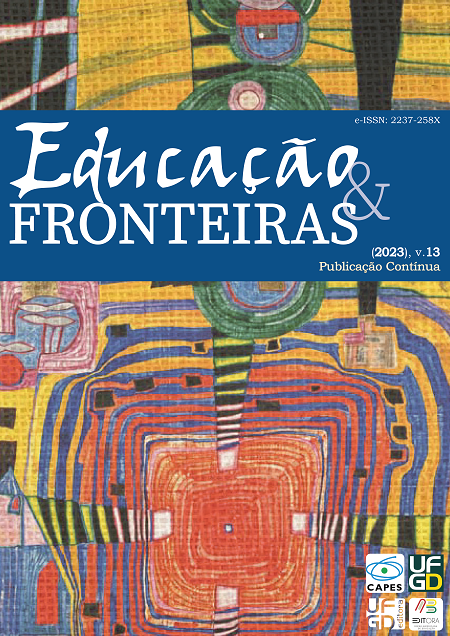The meaning of the Pedagogue’s Training
DOI:
https://doi.org/10.30612/eduf.v13i00.17639Keywords:
Pedagogy, Teaching, HabilitationsAbstract
The article revisits the effective participation of the Faculty of Education of the Federal University of Goiás (FE/UFG) in the movement of resistance and rupture to the model of Pedagogy course by qualifications. This work is a partial result of the interinstitutional research "The history of higher education in Goiás between the years 1980 and 1993: the meaning of the training of the pedagogue," and highlights the developments of the project of society based on the productivist tendency. The resistance and rupture of the FE/UFG to the qualifications and the epistemology that supported it were expressed in the defense of a formation based on teaching in the Pedagogy course. In 1984, Professor Ildeu Moreira Coêlho led this defense from the FE/UFG and, together with intellectuals such as Paulo Freire, Marilena Chauí, and Carlos Rodrigues Brandão, among others, participated in the debates. The discussion about the Pedagogy course is historical, a debate permeated by a correlation of forces, disputes, and interests that go beyond the field of education. Thus, there is a compelling need to consider the most recent discussions presented by the curricular guidelines intended to be implemented for Pedagogy courses, in a way to adapt teacher training courses to the National Common Curricular Base (BNCC). Therefore, the debate about the meaning of pedagogue training remains essential.
Downloads
References
BRASIL. Lei n.º 5.540, de 28 de novembro de 1968. Fixa normas de organização e funcionamento do ensino superior e sua articulação com a escola média, e dá outras providências. Diário Oficial da União: Seção 1, Brasília, DF, p. 10369, 1968.
BRASIL. Lei nº 5.692, de 11 de agosto de 1971. Fixa Diretrizes e Bases para o ensino de 1° e 2º graus, e dá outras providências. Diário Oficial da União: Seção 1, Brasília, DF, p. 6377, 1971.
BRASIL. Constituição (1988). Constituição da República Federativa do Brasil. Brasília, DF: Senado Federal: Centro Gráfico, 1988.
BRASIL. Ministério da Educação. Base Nacional Comum Curricular. Brasília: MEC, 2019.
CASTORIADIS, C. As encruzilhadas do labirinto: a ascensão da insignificância. Tradução de Regina Vasconcellos. São Paulo: Paz e Terra, 2002.
COÊLHO, I. M. A gênese da docência universitária. Linhas Críticas, Brasília, v. 14, n. 26, p. 5-24, 2008. DOI: 10.26512/lc.v14i26.3421. Disponível em: https://periodicos.unb.br/index.php/linhascriticas/article/view/3421. Acesso em: 15 jul. 2023. DOI: https://doi.org/10.26512/lc.v14i26.3421
DARDOT, P.; LAVAL, C. A nova razão do mundo: ensaio sobre a sociedade neoliberal. São Paulo: Boitempo, 2016.
FREIRE, P. Educação como prática da liberdade. Rio de Janeiro: Paz e Terra, 1989.
GRAMSCI, A. Concepção dialética da história. Rio de Janeiro: Civilização Brasileira, 1985.
HADOT, P. O que é a filosofia antiga?. 6. ed. São Paulo: Edições Loyola, 2014.
POLANYI, K. A grande transformação: As origens da nossa época. Rio de Janeiro: Editora Elsevier, 2000.
PRESTES, A. L. Três regimes autoritários na história do Brasil Republicano: O Estado Novo (1937-1945), a ditadura militar (1964-1985) e o regime atual (a partir do golpe de 2016). Revista de História Contemporânea, Rio de Janeiro, v. 13, n. 1. p. 108-129, 2019. Disponível em: https://revistas.ufrj.br/index.php/RevistaHistoriaComparada/article/view/27537/15041. Acesso em: 15 jul. 2023.
UNIVERSIDADE FEDERAL DE GOIÁS. Resolução 207/1984. Disponível em: https://docs.google.com/document/d/1ys82tqIIqtEsGJwn1POypgAzceUoHSq9jshRExTIs9g/edit. Acesso em: 24 set. 2023.
Published
How to Cite
Issue
Section
License
Copyright (c) 2023 Educação e Fronteiras

This work is licensed under a Creative Commons Attribution-NonCommercial 4.0 International License.









